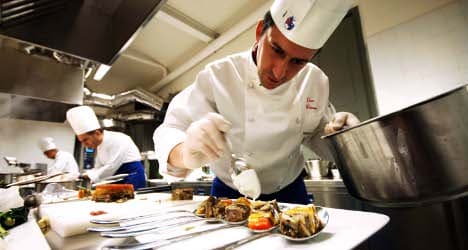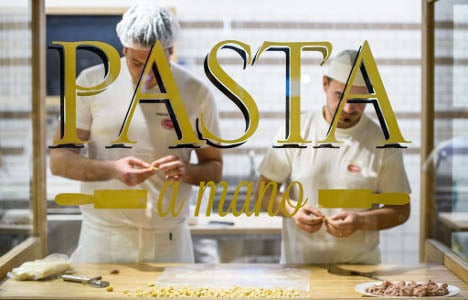'We aim to bring Italian excellence to the world'

With a difficult business climate at home, some Italian companies are focusing on foreign markets. The Local heads to Turin to find out how gourmet food company Eataly succeeded in going global.
Less than eight years after his father turned an old factory into a food store in Turin, Francesco Farinetti, the company's head of distribution, is waxing lyrical about Eataly’s global expansion.
“We’re growing in Italy but abroad we have the chance to grow even more,” he tells The Local over coffee at the company’s flagship store.
Likening Eataly’s format to that of Harrods in London, where customers can both dine and take produce home, Farinetti says the international market has been a key part of the business strategy.
“Perhaps it’s easier to open a store in Italy, but then afterwards it’s more difficulty because we’re in an economic crisis,” he says.
Italy’s economy is forecast to shrink by 0.3 percent in 2014 and return to growth next year. Eataly's foreign expansion, meanwhile, is set to see turnover reach €280 million this year.
Eataly opened its Turin store ahead of the downturn in 2007, with founder Oscar Farinetti making the unusual decision to launch in Tokyo the following year. He knew the market thanks to his time running the electronics company, UniEuro, and quickly set about opening 13 stores across Japan.
“It’s the New York of Asia,” says Francesco Farinetti. “If we can do it in Tokyo we can do it in other markets.”

Eataly now has over 3,600 employees and a presence in the US, Turkey and the UAE, with plans to open in Brazil and Russia next year. The latter could be subject to delays, however, as Russia earlier this year hit EU countries with a food embargo.
The company’s expansion can be put down to a mixture of courage and madness, plus a knowledge of numbers and the right contacts, Farinetti says.
“It’s fundamental to find the right people. You can have the best format in the world, but if you choose the wrong people you won’t be successful,” he says.
Eataly teamed up with restaurateurs Batali & Bastianich and Italophiles Adam and Alex Saper in New York, opening the first store in 2010 with a second planned for the city next year.
But despite rapid expansion, Eataly faces challenges in selling Italian food around the world.
“There are laws that act as obstacles to exporting certain foods, which come from a sort of protectionism,” Farinetti explains. “Italy has to lobby; this is an important cause for our country.”
While he highlights the Italian Trade Agency (Ice) as one way the government is helping companies move abroad, Farinetti says more needs to be done to support businesses internationally.
“[Italian] embassies should be transformed into offices of representation, to give a hand on the commercial side,” he says, helping businesses navigate new markets.
Eataly is also pushing the government to incentivize companies to go global, creating a “Made in Italy” trademark to ensure their products are quality-stamped.
“We can compete on quality; we can never compete on cost,” Farinetti says, lamenting the misleading Italy branding on cheap products made elsewhere.
The company’s future success depends on customers seeing food as an investment.
“The aim is to bring Italian excellence to the world,” he says.

Comments
See Also
Less than eight years after his father turned an old factory into a food store in Turin, Francesco Farinetti, the company's head of distribution, is waxing lyrical about Eataly’s global expansion.
“We’re growing in Italy but abroad we have the chance to grow even more,” he tells The Local over coffee at the company’s flagship store.
Likening Eataly’s format to that of Harrods in London, where customers can both dine and take produce home, Farinetti says the international market has been a key part of the business strategy.
“Perhaps it’s easier to open a store in Italy, but then afterwards it’s more difficulty because we’re in an economic crisis,” he says.
Italy’s economy is forecast to shrink by 0.3 percent in 2014 and return to growth next year. Eataly's foreign expansion, meanwhile, is set to see turnover reach €280 million this year.
Eataly opened its Turin store ahead of the downturn in 2007, with founder Oscar Farinetti making the unusual decision to launch in Tokyo the following year. He knew the market thanks to his time running the electronics company, UniEuro, and quickly set about opening 13 stores across Japan.
“It’s the New York of Asia,” says Francesco Farinetti. “If we can do it in Tokyo we can do it in other markets.”

Eataly now has over 3,600 employees and a presence in the US, Turkey and the UAE, with plans to open in Brazil and Russia next year. The latter could be subject to delays, however, as Russia earlier this year hit EU countries with a food embargo.
The company’s expansion can be put down to a mixture of courage and madness, plus a knowledge of numbers and the right contacts, Farinetti says.
“It’s fundamental to find the right people. You can have the best format in the world, but if you choose the wrong people you won’t be successful,” he says.
Eataly teamed up with restaurateurs Batali & Bastianich and Italophiles Adam and Alex Saper in New York, opening the first store in 2010 with a second planned for the city next year.
But despite rapid expansion, Eataly faces challenges in selling Italian food around the world.
“There are laws that act as obstacles to exporting certain foods, which come from a sort of protectionism,” Farinetti explains. “Italy has to lobby; this is an important cause for our country.”
While he highlights the Italian Trade Agency (Ice) as one way the government is helping companies move abroad, Farinetti says more needs to be done to support businesses internationally.
“[Italian] embassies should be transformed into offices of representation, to give a hand on the commercial side,” he says, helping businesses navigate new markets.
Eataly is also pushing the government to incentivize companies to go global, creating a “Made in Italy” trademark to ensure their products are quality-stamped.
“We can compete on quality; we can never compete on cost,” Farinetti says, lamenting the misleading Italy branding on cheap products made elsewhere.
The company’s future success depends on customers seeing food as an investment.
“The aim is to bring Italian excellence to the world,” he says.

Join the conversation in our comments section below. Share your own views and experience and if you have a question or suggestion for our journalists then email us at [email protected].
Please keep comments civil, constructive and on topic – and make sure to read our terms of use before getting involved.
Please log in here to leave a comment.